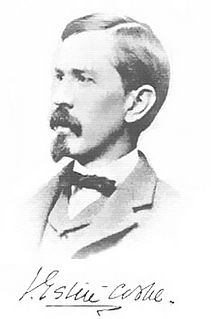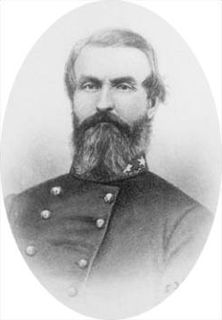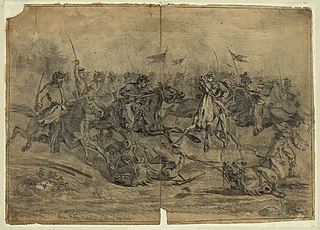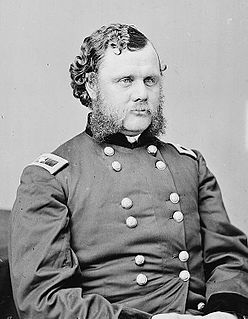History
Savas Beatie was established in late 2003, launching on January 1, 2004, when New York City attorney Russel H. "Cap" Beatie and Theodore P. "Ted" Savas [2] agreed to form the company. Savas, a licensed California attorney and author/editor, had been consulting with and working for a number of publishing companies. He was the co-founder (with David Woodbury) of Savas Woodbury Publishers (1992). The pair met in November 1988 in San Diego at a West Coast Civil War conference, discovered their mutual interest, and returned to the Bay Area (Woodbury lived and worked in San Francisco, Savas in San Jose) to launch the printed quarterly journal Civil War Regiments: A Journal of the American Civil War. This undertaking formed the foundation for what would soon become Savas Woodbury Publishers, a book publishing company that specialized in American Civil War titles. When Woodbury left in 1995 to pursue other interests, the company changed its name to Savas Publishing Company. The genres of publishing expanded at this time to include other historical topics, including World War II, the Indian Wars, and more general historical interests such as the bestselling 1912 Facts About Titanic. Savas Publishing was sold to Combined Publishing / Perseus Books Group in 2000.
Savas Beatie publishes books on various aspects of military, sports, and general history since 2004. In addition to print books, it maintains a robust digital publishing catalog, with nearly all of its titles available in all e-formats, and a growing list of titles available as audio books. Savas Beatie is distributed into the North America book trade by Casemate Publishing Company of Havertown, Pennsylvania, with Casemate UK handling European sales. Direct non-book trade sales are handled in-house.

John Esten Cooke was an American novelist, writer and poet. He was the brother of poet Philip Pendleton Cooke. During the American Civil War, Cooke served as a staff officer for Maj. Gen. J.E.B. Stuart in the Confederate States Army cavalry and after Stuart's death, for Brig. Gen. William N. Pendleton. Stuart's wife, Flora, was a first cousin of Cooke.

Paul Jones Semmes was a banker, businessman, and a Confederate brigadier general in the American Civil War, mortally wounded at the Battle of Gettysburg.

Little Round Top is the smaller of two rocky hills south of Gettysburg, Pennsylvania—the companion to the adjacent, taller hill named Big Round Top. It was the site of an unsuccessful assault by Confederate troops against the Union left flank on July 2, 1863, the second day of the Battle of Gettysburg, during the American Civil War.

The Battle of Brandy Station, also called the Battle of Fleetwood Hill, was the largest predominantly cavalry engagement of the American Civil War, as well as the largest ever to take place on American soil. It was fought on June 9, 1863, around Brandy Station, Virginia, at the beginning of the Gettysburg Campaign by the Union cavalry under Maj. Gen. Alfred Pleasonton against Maj. Gen. J.E.B. Stuart's Confederate cavalry.
The Battle of Averasborough or the Battle of Averasboro, fought March 16, 1865, in Harnett and Cumberland counties, North Carolina, as part of the Carolinas Campaign of the American Civil War, was a prelude to the climactic Battle of Bentonville, which began three days later.

Robert Emmett Rodes was a Confederate general in the American Civil War, and the first of Robert E. Lee's divisional commanders not trained at West Point. His division led Stonewall Jackson's devastating surprise attack at the Battle of Chancellorsville; Jackson, on his deathbed, recommended that Rodes be promoted to major general. Rodes then served in the corps of Richard S. Ewell at the Battle of Gettysburg and in the Overland Campaign, before that corps was sent to the Shenandoah Valley under Jubal Early, where Rodes was killed at the Third Battle of Winchester.

The Battle of Mine Run, also known as Payne's Farm, or New Hope Church, or the Mine Run campaign, was conducted in Orange County, Virginia, in the American Civil War.

Samuel Wylie Crawford was a United States Army surgeon and a Union general in the American Civil War.

Alfred Iverson Jr. was a lawyer, an officer in the Mexican–American War, a U.S. Army cavalry officer, and a Confederate general in the American Civil War. He served in the 1862–63 campaigns of the Army of Northern Virginia as a regimental and later brigade commander. His career was fatally damaged by a disastrous infantry assault at the first day of the Battle of Gettysburg. General Robert E. Lee removed Iverson from his army and sent him to cavalry duty in Georgia. During the Atlanta Campaign, he achieved a notable success in a cavalry action near Macon, Georgia, capturing Union Army Maj. Gen. George Stoneman and hundreds of his men.
The Battle of Hunterstown was an American Civil War skirmish at Beaverdam Creek near Hunterstown, Pennsylvania, on July 2, 1863, in which Wade Hampton's Confederate cavalry withdrew after engaging George Armstrong Custer's and Elon Farnsworth's Union cavalry.

On the third day of the Battle of Gettysburg during the disastrous infantry assault nicknamed Pickett's Charge, there were two cavalry battles: one approximately three miles (5 km) to the east, in the area known today as East Cavalry Field, the other southwest of the [Big] Round Top mountain.

James Jay Archer was a lawyer and an officer in the United States Army during the Mexican–American War. He later served as a brigadier general in the Confederate States Army (CSA) during the American Civil War.

Robert Ogden Tyler was an American soldier who served as a general in the Union Army during the American Civil War. He was commander of the Artillery Reserve of the Army of the Potomac at the Battle of Gettysburg in July 1863, where his artillery batteries played an important role in the Union victory. Tyler also led a division of heavy artillery turned infantry during the Overland Campaign of 1864. He was severely wounded at the Battle of Cold Harbor and relegated to administrative duties for the remainder of the war.

Johnston Hastings "Jack" Skelly Jr. (1841–1863) was a Union soldier — a corporal in the 87th Pennsylvania Infantry — who died as a result of wounds sustained at the Second Battle of Winchester. He was the friend, and possibly fiancé, of Ginnie Wade, the only civilian to die in the Battle of Gettysburg. He was buried in Evergreen Cemetery in Gettysburg, Pennsylvania, near Wade's grave.

George Boardman Boomer was a Union Army general who served as a brigade commander between February 12, 1863 and May 22, 1863 during the American Civil War. His principal service was during the heavy engagement of his brigade on May 16, 1863 at the Battle of Champion Hill during the Vicksburg campaign and in the second assault on Vicksburg on May 22, 1863. Colonel Boomer was killed near the Railroad Redoubt on the second day of major assaults on the City of Vicksburg on May 22, 1863. He was commissioned Brigadier General around the time of his death.

Failure in the Saddle: Nathan Bedford Forrest, Joseph Wheeler, and the Confederate Cavalry in the Chickamauga Campaign is a book written by Virginia Military Institute graduate David A. Powell, and published by Savas Beatie, analyzing the failures of Nathan Bedford Forrest and Joseph Wheeler in the American Civil War. Powell draws upon firsthand accounts, many previously unpublished, to offer a detailed examination of the Southern cavalry's role in the Chickamauga campaign.

Theodore P. Savas is a licensed attorney, former adjunct college instructor, entrepreneur, award-winning author, and publishing consultant and agent. He is best known as the co-founder and majority partner of Savas Beatie, an award-winning and influential independent book trade publishing company that specializes in military and general history, and especially the American Civil War. He personally writes and speaks about Civil War topics, as well as the American Revolutionary War, and WWII German U-boats.
The American Civil War bibliography comprises books that deal in large part with the American Civil War. There are over 60,000 books on the war, with more appearing each month. There is no complete bibliography to the war; the largest guide to books is over 40 years old and lists over 6,000 titles.
Noah Andre Trudeau is an American historian who has written books and produced programs for National Public Radio.
Eric J. Wittenberg is an American Civil War historian, author, lecturer, tour guide and battlefield preservationist. He is a practicing attorney in downtown Columbus, Ohio. His published works have focused especially on the Civil War cavalryman and the cavalry battles of the Civil War, with emphasis on the Army of the Potomac's Cavalry Corps. His first book, Gettysburg's Forgotten Cavalry Actions, was chosen as the best new work addressing the Battle of Gettysburg in 1998, winning the Robert E. Lee Civil War Roundtable of Central New Jersey's Bachelder-Coddington Award. The second edition of this book, published in 2011, won the U. S. Army Historical Foundation's Distinguished Writing Award for that year's best reprint. In 2015, his book The Devil's to Pay: John Buford at Gettysburg won the Gettysburg Civil War Roundtable's 2015 Book Award. He was a member of the Governor of Ohio’s Advisory Commission on the Sesquicentennial of the Civil War and has been active with several Civil War battlefield preservation organizations. He and his wife Susan Skilken Wittenberg reside on the east side of Columbus, Ohio.















